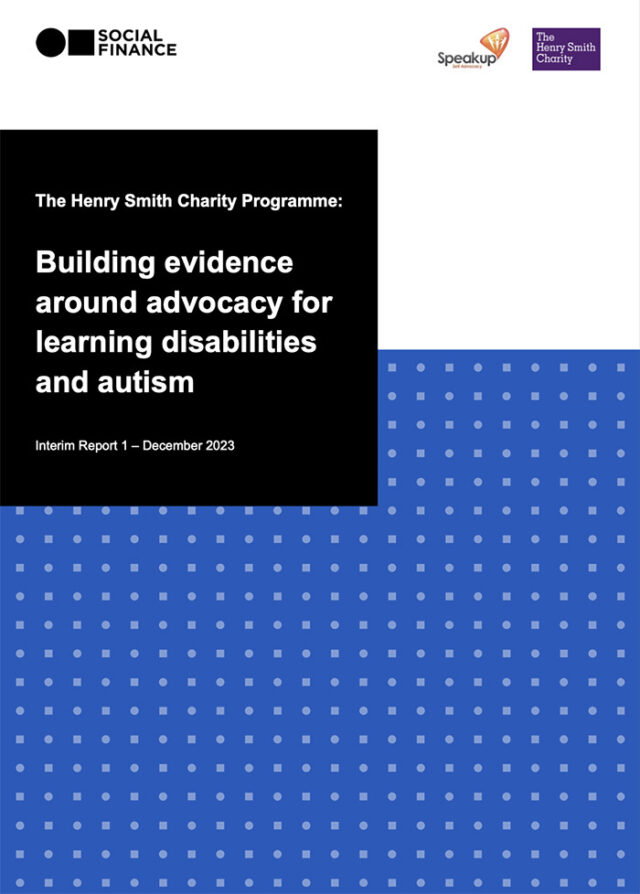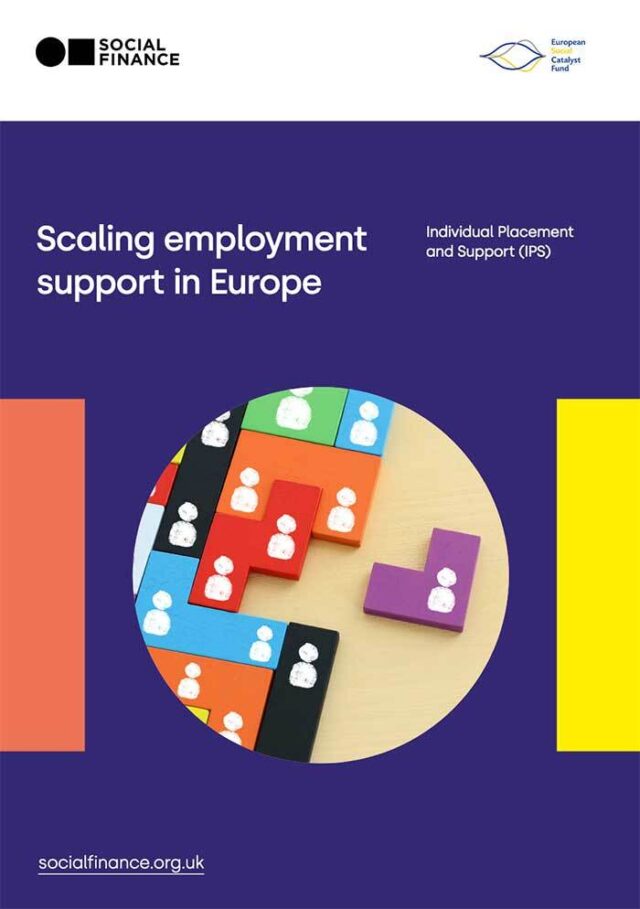
Employment support is a national health issue and ICBs play a crucial role

Labour will work with local areas to create plans to support more disabled people and those with health conditions into work. We will devolve funding so local areas can shape a joined –up work, health and skills offer for local people.
Labour Manifesto 2024
We are also in favour of devolved funding so that local areas, who understand the needs of their residents and employers, can deliver the personalised support required. But health services and Integrated Care Boards (ICBs) will be crucial to the success of this important policy goal.
Social Finance has deep experience in this space. For the last 10 years we’ve been increasing access to health-based forms of employment support, including Individual Placement and Support (IPS). This is a type of intervention that uses a personalised, health-based and strength-based approach to support people to find a job of their choosing.
High quality employment support improves health and wellbeing
IPS has a very strong evidence base and has been expanded in multiple settings, providing employment support not just for people with severe mental illness, but also for those with drug and alcohol dependencies, in primary care settings, and for individuals with learning disabilities or autism.
Take Sabiha, a bright chatty 21-year-old who loves her job in the canteen at a large firm in Canary Wharf in London. She’s almost unrecognisable from the teenager who struggled at school because of her learning difficulties and who would only communicate in writing when she first arrived at the Tower Project, one of 9 IPS services funded by Mental Health Employment Partnerships (MHEP), an initiative designed and managed by Social Finance to use social investment to expand access to IPS.

The staff at the Tower Project are all so supportive. They literally made me feel more confident and showed me who I am … When I got my first pay, I remember I screamed the house down and to my brothers and sisters I said, “Guess who got paid!” My parents are really happy. They are proud of me and they go, “Yeah, yeah you have achieved a lot.”
Sabiha Malik, Hospitality Worker, KPMG
Sabiha is one of more than 34,000 individuals in England who have received help to find a job through an IPS service in 2023.
Paying for employment support as a health intervention creates better outcomes
Integration between the health system and employment provider is crucial to the success of any IPS service and for the person seeking employment. Employment support is closely tied to medical treatment and the client gets joined-up messages from all the trusted professionals they’re working with.

It is very much face to face, building rapport, working with somebody’s motivation because it’s proven that really a predictor of somebody’s success to find paid employment is not their diagnosis, not how ill they are or have been. It’s their motivation.
Matt Morris, Senior IPS Specialist, Enable
In our MHEP services, we even combined funding from local and national government, health services and job centres into one pot, with each funder paying for the outcomes that mattered most. By only paying when support resulted in improved health and reduced usage of the health system, health commissioners were able to purchase employment services as a form of health treatment.
Matt Morris, a Senior IPS Specialist at Enable in Shropshire, another of the services funded by MHEP, has seen first hand how employment support can improve health and wellbeing.

“If you find employment stressful, try unemployment. Because if you want to work and you wish to work and everybody around you is telling you that, no, you shouldn’t be working, it’s too stressful; then that’s stressful! You’re trapped and you’re in a rut and end up cycling in and out of mental health services as a result.”
Matt Morris, Senior IPS Specialist, Enable
So here are our three recommendations for the health system to continue to improve the health and wellbeing of their residents by providing access to high quality health-based employment support:
In the 5 years Social Finance has been delivering IPS Grow, an NHS backed programme providing support to IPS services nationwide, we have found that the leadership and buy-in of senior clinicians, commissioners and policy staff within the health system can be the difference between success and failure of IPS implementation.
This is because the integration between health and employment support is so crucial to successfully overcoming health-based barriers to work.
The IPS model is currently being expanded in primary care and has huge potential to support even more individuals with a wide range of health-related conditions into work. ICBs can play a crucial role in providing leadership, governance and funding for IPS services.
There is a significant missed opportunity to help people stay in or return to work when they request a Fit Note.
Technically, GPs are able to provide support to help someone stay in work when issuing a Fit Note, but less than 7% of Fit Notes use this option. This is understandable given the pressure on stretched GP caseloads and that GPs are not trained employment specialists.
This is where embedding return to work specialists as allied health professionals (AHPs) within GP practices has huge potential.
Social Finance piloted this model with GPs in Leicester and Newcastle where over two thirds of individuals returned to work, on average 16 days sooner than comparator benchmarks. Crucially, the service also reduced repeat appointments and pressure on GP caseloads.
There is a very large and growing number of individuals who have a health condition and want to work, but do not have any kind of work-related requirement or are not in contact with the benefits system at all.
There may be stigma around accessing employment support through DWP or the Job Centre. So, health services have a crucial role to play in opening up conversations about work and helping people understand what health-based employment support is available. For example GPs, physiotherapists, counsellors, community nurses and midwives could point people to a local employment “front door” where they will be directed to appropriate services.
This can build on the work currently underway in 15 ICB areas of the country through WorkWell, which is developing system wide pathways for employment support.
Where next?
Since Social Finance started this work ten years ago, there has been a quiet revolution in health and employment services but it can go even further now.
The NHS in England made a clear commitment to make IPS employment support a core part of mental health services across the nation. The model has now been rolled out to every drug and alcohol treatment team and expanded in primary care settings and the evidence is clear – this works.
ICBs are now playing a leading role in shaping health and work systems locally through WorkWell pilots too. But with 2.83 million people off work due to long-term health conditions – highest number that it has ever been – ICBs must continue to play a vital role in ensuring everyone has the opportunity to benefit from life transforming, high quality employment support.
Want to find out more?
To learn about commissioning and delivering IPS, visit www.ipsgrow.org.uk, and to learn more about the support we can provide to local areas to deliver high quality employment support, contact Bex our Employment Lead at bex.spencer@socialfinance.org.uk.
Get in touch



